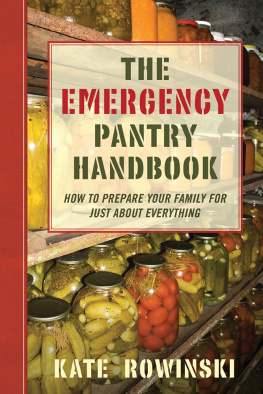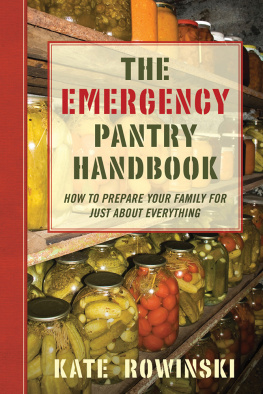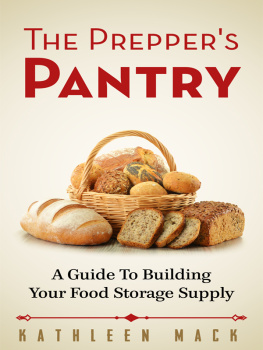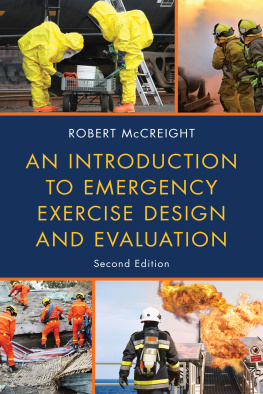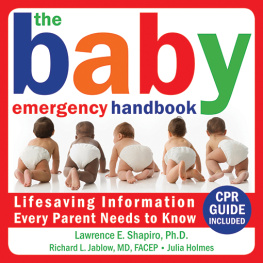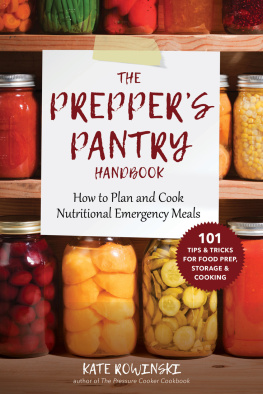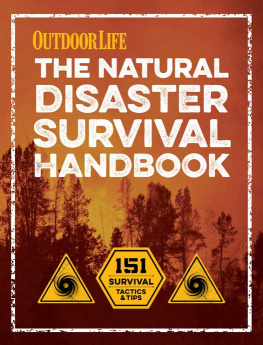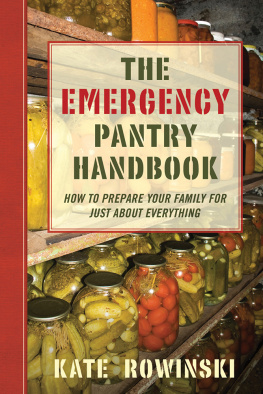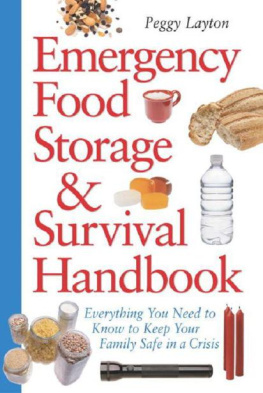The Emergency Pantry Handbook
How to Prepare Your Family for Just about Everything
Kate Rowinski
Photography by Jim Rowinski

Skyhorse Publishing
Copyright 2013 by Kate Rowinsky
Photographs copyright Jim Rowinsky
All Rights Reserved. No part of this book may be reproduced in any manner without the express written consent of the publisher, except in the case of brief excerpts in critical reviews or articles. All inquiries should be addressed to Skyhorse Publishing, 307 West 36th Street, 11th Floor, New York, NY 10018.
Skyhorse Publishing books may be purchased in bulk at special discounts for sales promotion, corporate gifts, fund-raising, or educational purposes. Special editions can also be created to specifications. For details, contact the Special Sales Department, Skyhorse Publishing, 307 West 36th Street, 11th Floor, New York, NY 10018 or info@skyhorsepublishing.com.
Skyhorse and Skyhorse Publishing are registered trademarks of Skyhorse Publishing, Inc., a Delaware corporation.
www.skyhorsepublishing.com
10 9 8 7 6 5 4 3 2 1
Library of Congress Cataloging-in-Publication Data is available on file.
ISBN: 978-1-62087-590-2
Printed in the United States of America.
Contents
Introduction
Why Do You Need a Food Pantry?
In this uncertain day and age, it seems that potential disasters lurk around every cornerwild weather, the threat of terrorism, economic concerns it is easy to feel that you and your family could fall victim at any moment. Ask yourself these questions: What if we lose power or the water is shut off? What if I lose my income? Could I feed my family for a day, a week, even a month? What if access to grocery stores was unavailable? Do I have a way to store and cook food in my home?
With fast food and easy access to almost anything, it may be hard to imagine a world of scarcity. But the reality is that scarcity can happen in an instant. A large tree falling on a road may keep you from the store for a day. A power outage may keep the stores closed for a week. Job loss may prevent you from shopping for three months or more.
You dont have to be a doomsday believer or a radical survivalist to consider creating your own emergency food pantry. In fact, the idea of not having a back-up supply of food should be as nonsensical to you as not having a tank of gas or extra batteries.
Rather than allowing the specter of disaster to loom in the back of your mind, there are simple steps you can take to make sure that your familys basic needs can be taken care of in the event of an emergency. Establishing a food plan gives you the following benefits:
A Powerful Insurance Policy
Food storage is the most powerful of all bank accounts, allowing you to get through any lean times without desperation or handouts. Knowing that you have what you need no matter what happens can give you peace of mind that no homeowners policy could ever provide.
A Sense of Self-Sufficiency
Knowing that you can take care of yourself and your family has a powerful effect on your psychological state. Taken even further, understanding how to grow and preserve your own food will give your family greater appreciation for where their food comes from and a sense of gratitude for what they have.
Helping Others
Did you know the average family has less than a weeks worth of food in their kitchen right now? And worse yet, if there was no power, many people wouldnt even know how to cook it! Your food pantry and cooking plan will not only help keep your family safe, but may allow you to help others as well.
Not long ago, a hurricane knocked out power to our area, taking down trees that prevented us from getting out for a few days. We were astonished to learn that most of our neighbors were not prepared to do something as simple as heating a can of beans. They could have gotten by on cereal or cheese and crackers for a couple of days, but many relied entirely on electric ranges and some had outdoor grills that were out of propane. Worst of all, many had no emergency water stored. Its not that they were completely without resources; they just didnt have a plan.
But what could have been a very uncomfortable situation turned into a party. People contributed food out of their now-useless freezers, and our emergency cooking plan fed the whole neighborhood for three days. We distributed gallons of drinking water and a neighbor with a swimming pool supplied water for toilets.
So how do you plan for unexpected events?

Establish Your Goals
Creating a food pantry may seem like a daunting task. Dedicated space is needed, time is required, both to gather supplies and to maintain them, and you have to be able to afford the necessary supplies to get started. So first take the time to determine what you want to accomplish.
Establish how much money and space can be allocated to your food storage project. It is important to take stock before rushing out and buying supplies willy-nilly. It is not necessary to create a millennial plan in order to begin, but it isnt enough to just run out and buy extra food. If you arent ready for a big commitment, just start out with a carefully planned three-day supply of food and water. Even this small step will put you ahead of most of your neighbors. You will find that a lot of the components that go into being self-sufficient for three days are the same things that you need for longer term planning. So go slowly and get it right in the beginning. You will end up with a better plan all around.
As you grow comfortable with the planning process, it will be time to expand your pantry to include long-term storage. Again, think about your goal. Consider the degree of self-sufficiency you are seeking. Even if you think you want a one-year supply of food, start by working on your three-month plan first. Remember, a large supply of food requires care and rotation; its not enough to just go out and buy a lot of food.
Once you have committed to the size and scope of your pantry, you are ready to get into the details. Chapters 3 and 4 will take you through the process of planning and execution.
One Step at a Time
Emergency food planning is not an all-or-nothing proposition. As soon as you start to think ahead, you will quickly find that every step you take, no matter how small, gives you more control over your situation than you had before.
Begin by stocking a three-day supply of food for your family. Make sure you include nutritious items that dont require refrigeration or cooking.
Store water! Have at least three gallons on hand for each member of the family.
Slowly build your supply of staples and family favorites so that you could comfortably get by for two weeks.

Assess Your Resources
How much space is available for food storage? There is no point in making a one-year plan if your storage is going to be limited to a spare closet. Look around your home and think creatively, keeping in mind that the location you choose should be dry with a reasonably consistent temperature. Damp basements, freezing garages, or hot attics are not good choices.
What are your cooking arrangements if energy sources are limited? Take stock of your home. Is there a fireplace or wood stove that could be pressed into service? If not, do you have outdoor space for propane or charcoal cooking? What kinds of food would you need if no cooking was possible?

